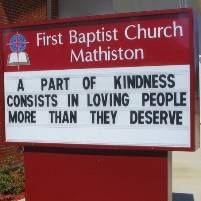Are Poorest States Also Most Religious?
Wednesday, December 30, 2009
 Mathiston, Mississippi (photo: Steve Garufi)
Mathiston, Mississippi (photo: Steve Garufi)
Does lack of income drive people to church? Data compiled by the Pew Forum on Religion and Public Life and the U.S. Census Bureau would indicate a correlation between high levels of poverty and large concentrations of religious Americans. For instance, the Pew Forum lists Mississippi as the most religious state, with 82% saying religion is very important in their lives. The state also has the highest percentage of poor people in the country (20.8%).
No. 2 in terms of poverty is Louisiana (17.6%), which ranks fourth on the religious scale. With the exception of Oklahoma, the rest of the top 10 most religious states are all found in the South: Alabama, Arkansas, Tennessee, South Carolina, North Carolina, Georgia and Kentucky. All of these states rank near the top for highest concentrations of poor people, ranging from 14.6% to 17.3%.
At the other end of the scale, New Hampshire, which has the lowest poverty level, also has the lowest percentage of citizens for whom religion is very important: 36% (when combined with Vermont). The second least religious state, Alaska, has the fifth lowest poverty rate.
-Noel Brinkerhoff
How Religious Is Your State? (Pew Forum on Religion and Public Life)
Small Area Income and Poverty Estimates (U.S. Census Bureau)
- Top Stories
- Unusual News
- Where is the Money Going?
- Controversies
- U.S. and the World
- Appointments and Resignations
- Latest News
- Musk and Trump Fire Members of Congress
- Trump Calls for Violent Street Demonstrations Against Himself
- Trump Changes Name of Republican Party
- The 2024 Election By the Numbers
- Bashar al-Assad—The Fall of a Rabid AntiSemite






Comments